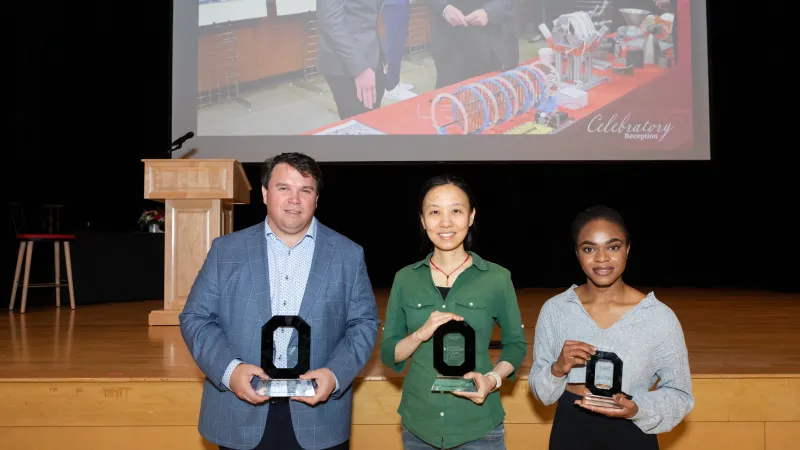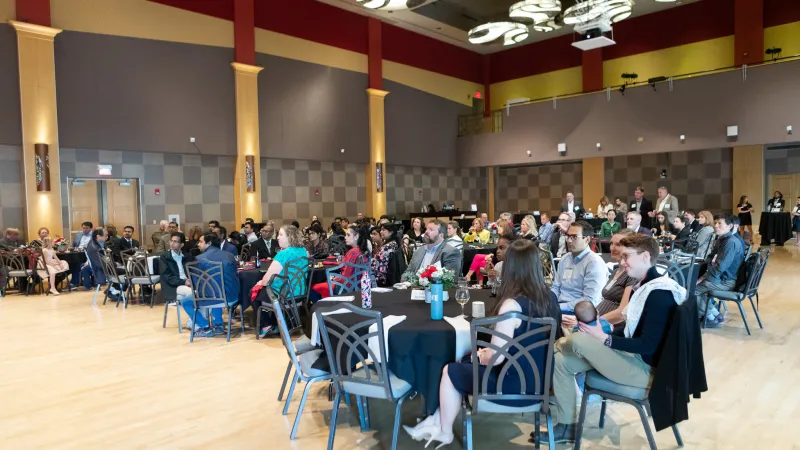
At a special reception held on Thursday, April 20, Oluwatosin Ayinde, a doctoral student in the College of Pharmacy, was named Next Generation Innovator of the Year. The Next Generation Innovator of the Year recognizes postdocs, undergraduate or graduate for innovation and entrepreneurship that has contributed to the development or commercialization of a new technology or a trainee-initiated start-up company whose success is a result of entrepreneurial talent, creativity and energy.
Oluwatosin (Tosin) Ayinde
Ayinde is a graduate student in the medicinal chemistry and pharmacognosy. Her work is focused on the design of novel protein degraders targeting Cyclin Dependent Kinase 9 (CDK9), a key protein in Acute Myeloid Leukemia (AML), in collaboration with two senior researchers. Although CDK9 has been recognized as an important target for CDK9 therapy, small molecule inhibitors have unfortunately failed in the clinic for various reasons. With this in mind, Ayinde has worked on a complimentary approach to targeting CDK9 using protein degraders to overcome some of the limitations observed with the small molecule drugs. Ayinde has published two papers, with an additional paper under review, and has been an inventor on two provisional patent applications within the past year. Prior to beginning her graduate studies in 2019, she worked as a scientist for Thermo Fisher’s bioanalytical R&D area. Following graduation at Ohio State, she will work on postdoctoral studies at the National Cancer Institute Center for Cancer Research, a division of the National Institutes of Health. Her work has been recognized with graduate student research awards from the Division of Medicinal Chemistry and Pharmacognosy in both 2021 and 2022. She has also been recognized for her efforts with an OSUCCC Pelotonia pre-doctoral fellowship and an American Society of Hematology Minority fellowship. Ayinde earned her bachelor’s degree from East Caroline University in chemistry, including a biology minor, and her master’s degree in medicinal chemistry and pharmacognosy from Ohio State.

Darrah, Li and Ayinde named Ohio State Innovators of the Year

Celebration reception in the Performance Hall at the Ohio Union on the Ohio State campus.
Congratulations to the Next Generation Innovator of the Year finalists
Tessa Cannon
College of Arts and Sciences
Department of Anthropology
Tessa Cannon is a graduate student and Presidential Fellow in the Department of Anthropology. A species of West African monkey, the sooty mangabey, is the natural reservoir of SIV that became HIV-2 when it crossed the species gap to humans. Sooty mangabeys carry the virus but do not develop AIDS despite bearing very high viral loads. Cannon’s work focuses on understanding relationship between the natural feeding ecology, gut microbiome and ability of sooty mangabeys to resist AIDS, we are better able to understand the pathogenesis of SIV, HIV and, ultimately, AIDS in humans. Her work is first to integrate eco-behavioral information (including data on viral load) on sooty mangabeys in their natural habitat with similar data on these monkeys under laboratory conditions. It has relevance in the domains of public health, primate behavioral ecology and conservation. In support of her PhD project, Cannon received funding form the President’s Research Excellence program and several awards from the Infectious Diseases Institute. In 2022, she was awarded a Presidential Fellowship, the most prestigious award given by the graduate school. She founded For the Love of Primates, a non-profit sanctuary for retired research primates, which earned her a President’s Buckeye Accelerator award in 2022. Cannon serves as Chair of the Graduate Student in Anthropology Committee, works as a vet tech for the Central Ohio Programs for Animal Welfare and the Humane Society, works as an undergraduate mentor in the Hale Lab, and is an adjunct professor at Columbus State Community College. Cannon earned her bachelor’s degree in zoology from Ohio Wesleyan University, her master’s degree in primate conservation from Oxford Brookes University and is a certified veterinary technician.
Rushikesh Joshi
College of Engineering
Department of Chemical and Biomolecular Engineering
Rushikesh (Rush) Joshi is a doctoral student in the Department of Chemical Engineering. Joshi’s multi-dimensional research aims to develop next-gen technologies for converting low-grade feedstocks such as biomass, waste plastics, waste gases, biogas, or stranded natural gas into energy carriers such as hydrogen and liquid fuels using chemical looping. This process that can convert these feedstocks into hydrogen and liquid fuels energy-efficient and economically while capturing the CO2 released in the process. Joshi’s work offers more sustainable alternatives for hydrogen production, biomass processing and waste plastics processing using chemical looping technology. Joshi is also working on more effective plastic recycling using the chemical looping platform to design a plastics treatment technology that generates energy carriers such as hydrogen or syngas from waste plastics. This work has been filed as a provisional patent. His research has led to five patent applications and 11 journal publications (6 published, 5 under review), and a conference presentation. Joshi is a teaching assistant for the Advanced Kinetics course and has served as a research mentor for undergraduate students at Tuskegee University and local high school students. He received the Outstanding Graduate Award for Academic Achievement in March for recognition for distinguished research in chemical engineering at Ohio State. Joshi earned his bachelor’s degree in chemical engineering from the Institute of Chemical Technology in Mumbai, and held internships at Bhabha Atomic Research Centre and CSIR-National Environmental Engineering Research Institute.